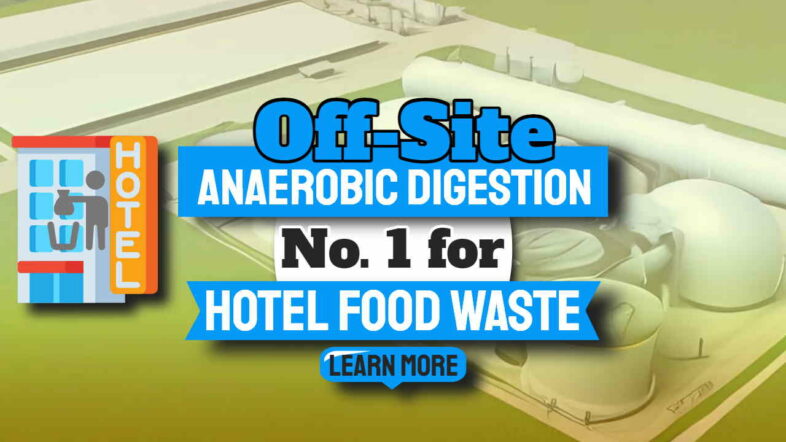In this article, we make the case for off-site anaerobic digesters as the most sustainable option for Hotel Food Waste disposal.
The hotel industry is a critical part of the economy of many nations and its sustainability is critical to its future. Even as long ago as 2008, the Intergovernmental Panel on Climate Change (IPCC) reported that unless global emissions are cut by at least 50 percent by the year 2050, the world will experience unprecedented levels of global warming. This would bring with it potentially devastating consequences for sustainable development, human health, agriculture, ecosystems, and economies (IPCC, 2008).
A major cause for concern is the very high level of food waste produced daily by the hotel industry. Any plan to improve the sustainability of a hotel needs to start by considering the impact of hotel food waste.
Sustainable Options for the Hotel Industry
There are a number of sustainable food waste disposal alternatives that can be implemented to help reduce emissions and improve the hotel and hospitality/ events industry's sustainability.

Sustainable Food Waste Disposal
An anaerobic digester is a machine that breaks down organic material, such as food scraps or manure, into methane, carbon dioxide, and water vapour.
The methane can be used to generate electricity and heat, while carbon dioxide at about 20% of the total gas output, and water vapor are released into the atmosphere. Additional carbon emissions saving outputs are also gained:
- by fertilizer production from the residue known as digestate, and
- heat utilized by CHP installations.
Nowadays, the anaerobic digestion process is recognized by climate change experts globally to be the preferred option for food waste disposal in preference to aerobic digestion/ composting, and it is vastly preferred to landfill where it produces vast amounts of the very damaging greenhouse gas methane which escapes into the atmosphere in vast quantities.
Experts suggest that even for landfills where the methane (landfill gas) is collected only a little more than 50% can be captured and either flared (that also produces CO2), or used to fuel gas engine generators for electricity.
On-Site Anaerobic Digesters for Hotels
An on-site aerobic digester can in theory be a great solution for hotel businesses that produce large quantities of organic waste. But while in theory, it can be a cost-effective way to reduce greenhouse gas emissions in practice it is not advisable.
The reality of performing an essentially odor-producing activity in close proximity to guests staying on the premises would make this a risky choice.
Depackaging Hotel Food Waste with Disposal to an Anaerobic Digestion Plant
That leaves the option of an off-site anaerobic digester.
It is common practice for a hotel to pay for a waste collection company to remove unprocessed food waste bins from hotels and other premises. The food content will always be mixed with items such as packaging, dirt, and a plethora of other objects and materials which get thrown in and simply should not be there.
Food waste in that form is of no value and removal must be paid for. But using equipment to depackage, separate, and clean the rejected materials to optimize the output of the organic content first, can be a great solution for businesses that produce large quantities of organic waste.
That is due to the fact that processed organic pulp has real value to biogas plant operators and can be sold to them. A clean reject stream will also provide valuable recyclates, not least plastic for reuse after processing back into the plastic resin pellets used to make new plastic packaging items.
The use of an off-site anaerobic digester can be part of a low-carbon transition plan for hotel businesses. While simultaneously this becomes a cost-effective way to reduce greenhouse gas emissions.
Not only does an off-site aerobic digester reduce environmental pollution, but it can also create biogas which when purified becomes “biomethane”. Biomethane is a form of pure methane which can be used as fuel for heavy goods vehicles among others or injected into the natural gas grid.
Transition to Climate-friendly Fuels
Another alternative is to transition to low-carbon or climate-friendly fuels. Renewable energy sources such as solar and wind power could be used to power hotels, reducing emissions and improving the GHG profiles.
The addition of hotel food waste to further raise the recycled output of green energy also has the potential to create jobs in the renewable energy sector.
Better Energy Efficiency Hotel Buildings
![]() Next in priority to the above option for improving hotel food waste sustainability, is to improve the energy efficiency of hotel buildings.
Next in priority to the above option for improving hotel food waste sustainability, is to improve the energy efficiency of hotel buildings.
Many of the buildings that are currently in use were designed decades ago and are poorly insulated. But that's another story not to be discussed here.
Alternative On-Site Solutions for Hotel Food Waste Disposal
Hotel food waste disposal can present a variety of alternative on-site solutions. The most common option would be to create a compost heap somewhere in the hotel gardens for sorting and composting food waste.
This would allow the hotel to avoid having to dispose of food waste in landfill, which can be costly and environmentally harmful.
On-Site Aerobic Digesters Also Help Reduce Food Waste at Hotels
A study by the US National Renewable Energy Laboratory found that an on-site aerobic digester at a hospitality venue reduced hotel food waste by 52% and emissions by 36%. Additionally, an aerobic digester at a hotel has the advantage of a low odor risk and runs automatically.
Hotels should consider installing on-site either an anaerobic digester or an aerobic digester to help reduce food waste and emissions.
Additionally, a food waste disposal system that uses aerobic digestion to break down food waste can be an environmentally friendly option that helps to reduce environmental pollutants.
Hotel Food Waste On-Site Aerobic Digesters can Reduce Use of Landfill
According to an article by Diana Perez of GreenBusinessMagazine, “on-site aerobic digesters” are a valuable tool for reducing environmental pollution and improving sustainability.
Another recent study found that up to 40% of food wasted in hotels could be prevented with the use of aerobic digesters. The study, conducted by Green Planet Reports, surveyed 194 hoteliers in North America and Europe about how they are combating food waste.
The overwhelming majority of respondents said that on-site hotel food waste recycling either via aerobic or anaerobic digestion is essential to their success in reducing waste and preserving resources.
Hotels generate an estimated 20 million pounds of food waste per day, and the average hotel generates about 2,000 pounds of food waste each day.
Hotels Leading the Way Towards Zero Waste
![]() A growing number of leading hotels are leading the way towards zero waste. From designing their own waste diversion programs to creating composting or recycling facilities on-site, these hotels are demonstrating that it is possible to operate responsibly and achieve significant environmental benefits.
A growing number of leading hotels are leading the way towards zero waste. From designing their own waste diversion programs to creating composting or recycling facilities on-site, these hotels are demonstrating that it is possible to operate responsibly and achieve significant environmental benefits.
As cities and countries around the world grapple with the challenges of climate change, reducing our reliance on finite resources has become even more important. By reducing our waste output, we can help reduce the amount of greenhouse gas emissions that are responsible for climate change.
Similarly, hotels have a great opportunity to create a positive environmental impact by diverting waste from landfills. This not only helps reduce the amount of hotel food waste that ends up in the environment, but it also creates jobs and economic opportunities.
In addition to creating environmental benefits, implementing a zero-waste policy can also save the hotel considerable money. Byproducts of waste management, such as compost, can be sold to local farmers or used to generate energy.
Using Big Data to Find and Redirect Capital
By using big data, businesses can find and redirect wasted capital to the front line. By doing this, companies can improve their bottom line, reduce customer service costs, and improve overall operational efficiency.
Traditional methods for monitoring capital allocation are time-consuming and expensive. With big data, however, companies can identify patterns and correlations in data sets to identify where wasted capital is being invested.
By using this information, businesses can redirect capital to the front line and improve their bottom line. For example, a company can investigate how much capital is being invested in new product launches versus customer acquisition.
By understanding how much money is being spent on overhead and expansion, the hotels can redirect that money to essential areas such as customer service. By doing this, companies can improve customer engagement, grow their customer base, and reduce customer service costs.





